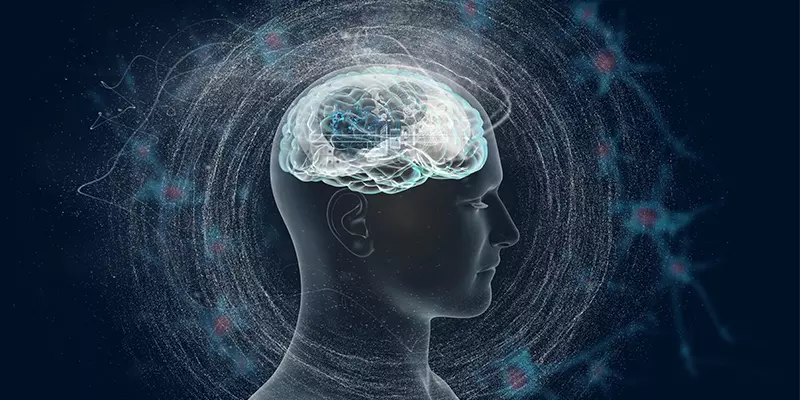
Content updated from previous publish date.
Your brain controls your entire life and everything you think, say and do. It’s the most important organ in your body… but how much do you really think about it? And if you do think about it, do you really know how to take care of it? After more than 3 decades of clinical practice, psychiatrists, integrative medicine (also known as functional medicine) physicians, and brain health experts at Amen Clinics have seen many bad brain habits. Unfortunately, some of the most common brain mistakes negatively impact success at work; damage relationships; lead to issues like memory loss, cognitive decline, depression, and anxiety; and ultimately, ruin lives. How many of these brain mistakes are you making?
Some of the most common brain mistakes negatively impact success at work; damage relationships; lead to issues like memory loss, cognitive decline, depression, and anxiety; and ultimately, ruin lives. Click To Tweet10 WORST HABITS FOR YOUR BRAIN
Here are the top 10 biggest mistakes people make when it comes to the brain:
1. Not caring about your brain
Being oblivious about the health of your brain is one of the worst mistakes you can make. It means you don’t think about the consequences of your thoughts and actions or how they influence your brain health, cognitive performance, or mental well-being. If you want to be happy, productive, and effective in your daily life—now and years in the future—you must love and care for your brain.
2. Letting kids put their brains at risk
It only takes one head injury to change the course of a child’s or teenager’s life forever. Don’t let kids play contact sports, and don’t make the mistake of thinking helmets protect their brains. They are designed to protect against skull fractures, but they do not necessarily prevent damage to the brain, such as abnormal activity or decreased blood flow. You need to protect their developing brains.
3. Poisoning your brain
Drinking too much or using drugs (even some prescription medications), smoking (or vaping), consuming excessive caffeine, and exposure to environmental toxins all reduce brain blood flow and activity, which negatively affects cognitive abilities as well as moods. Alcohol is NOT a health food!
4. Low-fat diets
The brain is 60% fat and its 100 billion nerve cells have membranes that are lined with essential fatty acids. Omega-3 fatty acids support and enhance your brainpower. Low cholesterol is associated with homicide, suicide, depression, and autism.
5. No clear goals to help the brain achieve
Without specific goals to help you guide your behavior, you’re more likely to fall into negative patterns that are harmful to the brain. Setting goals and working to achieve them provides a sense of accomplishment. With goals, your life becomes more conscious, and your energy is directed in healthy ways.
6. Too much screen time
Constantly checking your email, scrolling through your social media feed, and bingeing on Netflix are activities that hijack your brain. And the research is compelling: As video game and technology usage goes up, so do obesity and depression. Limit screen/device time to no more than 30 minutes a day. This may be hard for kids and teens, but it can make a huge difference, especially if they struggle with focus and attention, or if they have ADD/ADHD.
7. No new learning
When you stop learning, your brain starts dying. And it puts you at increased risk for memory problems. Your brain is like a muscle—the more you use it, the stronger it gets! Your brain needs a constant stream of new challenges, adventures, sights, and skills to remain active over time.
8. Not seeking help for mental health issues or memory problems
Did you know that it takes an average of 11 years from the time mental health symptoms arise until a person gets treatment, according to the National Alliance on Mental Health? Untreated mental health problems can devastate your life and increase the chances of job failure, divorce, unhappiness, and even suicide. Similarly, dementia processes start in the brain decades before symptoms appear. Early detection with brain SPECT imaging gives people the opportunity to address these issues during the early stages—when treatment is likely to be most effective.
9. Believing every negative thought you have
ANTs are those pesky “automatic negative thoughts” that pop up in your brain automatically and ruin your day. Left unchallenged, they will take over your thoughts and increase the levels of stress hormones circulating through your body, which lowers your brain reserve, increases anxiety, impacts your moods, and puts you at greater risk for age-related cognitive decline.
10. Not caring for the brains of your loved ones
Did you know that the health of your family and friends is one of the strongest predictors of longevity? A friend is someone who helps their loved ones be successful, while an accomplice is someone who helps them maintain their bad habits. Be a friend to the people you love and spread the word about brain health.
STOP MAKING MISTAKES REGARDING YOUR BRAIN HEALTH
When you discard the 10 bad brain habits and replace them with strategies that boost brainpower, you lay a foundation for success in all aspects of life. Learning to love and care for your brain and seeking help for any brain-based mental health issues early can turn your life around.
Depression, anxiety, aggression, suicidal thoughts, and other mental health issues can’t wait. At Amen Clinics, we’re here for you. We offer in-clinic brain scanning and appointments, as well as mental telehealth, clinical evaluations, and therapy for adults, teens, children, and couples. Find out more by speaking to a specialist today at 888-288-9834 or visit our contact page here.





How do issues like RA, Sjogrens and other autoimmune diseases affect your brain?
Comment by Donna Baggett — January 24, 2018 @ 3:31 AM
What a great article. I was hit in the head as young adult and I use to fall out of the top bunk bed as a child. I dealing with use brain fog and depression.. I’m 59 yrs old. I’ve called your office but I can not afford your prices. My insurance is with Kaiser which is a ppo. Will you suggest something I can do and take to help heal my brain. I want to be well.
Thank you,
Katherine Henderson
Comment by Katherine Henderson — January 24, 2018 @ 7:58 AM
Don’t you mean high cholesterol leads to depression suicide etc? Thanks
Comment by Teresa jones — January 24, 2018 @ 8:00 AM
No Dr. Amen does mean low cholesterol diets are bad for the brain. As well as lopp-sided Omega 3 vs. Omega 6 oils in the diet. It is time for everyone concerned about cognitive capacity as we age to rethink low cholesterol diet recommendations and the results we have seen from that diet.
Comment by Terry — January 24, 2018 @ 10:14 AM
Love the series! I’ve had Several head injuries. At 81 my memory is getting shorter and I’m following everything yet you said for the most part. However I would like a list of what I should be taking and how much. I am currently in on clonazepam or spasms and metoprolol For tachycardia. Any help you can offer would be greatly appreciated. Thank you.
Comment by Phyllis — January 24, 2018 @ 1:35 PM
In this article dr. Amen advice us to limit screen/device time to no more than 30 minutes a day.
I am surprised !
I have bills to pay,e-mails to answer,newpapers to read and I love to take my daily chess lessons online,just like I now learn to play bridge by reading about it online.
And I have to stop doing all this ?
Tell me I misunderstood the advice given .
Comment by Turid — January 25, 2018 @ 5:49 AM
I had scarlet fever in the 1940’s and didn’t die because of antibiotics. I also fell and had a brain bleed. Now, I’m in my 80’s and not doing well in the head. Did the antibiotics make me lose my mind?
Comment by Eileen the wanderer — January 25, 2018 @ 8:29 AM
Low Cholesterol is associated with homicide,suicide,depression and autism wow !!
Comment by noreen smith — October 12, 2018 @ 3:31 AM
Do you take Aetna Insurance for brain scans?
I did neuropsch testing on 9/4 but have not had a brain scan.
Comment by jennifer — October 12, 2018 @ 4:22 AM
I have been on 5 medication for bi-polar and schizoid affective disorders for 40 years. The Lithium I take has given me a thyroid problem, and is starting to touch my kidney. I work and go to school, and function pretty well, but am wondering if there is a better way than all this medication.
Comment by Martha Garveiy — October 12, 2018 @ 7:24 AM
I am 71 who has been using Nitrous Oxide when having dental and periodontal procedures done and wouldn’t have been able to get through these procedures without it. What are the long term effects on my brain, if any?
Comment by Ann Shaw — October 13, 2018 @ 3:50 AM
I had surgery many years ago to remove part of my thyroid gland due to a tumor. I take Levothyroxine. My mother had dementia or Alzheimer’s. I am having slight memory loss and loss of interest in regular activities. How would that affect my brain?
Comment by Helen — October 13, 2018 @ 7:24 AM
I’ve written before concerning my grand day Ellie. She has had issues since she was born. I don’t feel she has had a proper diagnoses and therefore we don’t know what the best course of action is for her. She has been diagnosed with ADHD and miid disorder as well as depression…. Currentky She takes a drug called Atomoxetine HCL 25 MG capsules. She was also just switched to Risperidone 0.5 mg (Risperdal 0.5 mg,) which will probably have to be increased. These help stabelze her moods but not as effectively as us needed.
We live in Tennessee and her insurance is currently TENNCARE. I’m pretty certain you won’t accept it to cover a scan for her but I want to get her accurately tested somewhere.
Her behavior issues have disrupted the whole family especially my daughter in law who has to be her primary care giver. She is not a biological child. My son and daughter in law took her in after her biological mother was not able to take care of her due to drug abuse. Yes the mother took drugs during the pregnancy which I’m certain have been the reason for much of the problems my grand daughter has suffered.
Would you be able to help us and maybe recommend a clinic or a physician that would be a good resource to maybe give us a proper diagnoses of her condition and a possible course of treatment? I have suggested that my son and daughter in law seek out family counseling since this is such a trying situation and I’ve told them they can’t possibly know how to treat the situation without the proper “tools” to cope. But my daughter in law feels like it’s interference and that she is being told she is not a good parent. The truth is she has gone far and beyond what any one else in the family has done and if it were not for she and my son there is no telling where this child would be right now. I also have a biological grand son that this effects as well. When there is a special needs child in a home, we all know it affects the whole family.
Any advice you offer would be greatly appreciated. If you would like to reach me.
Thank you in advance for your response.
Sincerely,
Carol Wade
Comment by Carol Wade — October 13, 2018 @ 1:00 PM
So, what are your prices for SPECT and the psychological/neurogical assessments workup? I am very interested.
Comment by Gordon Harrison — October 14, 2018 @ 8:15 AM
Hello,
I have a 28 year old son who I believe suffers from depression. He used to smoke marijuana but has stopped. I live in Jamaica and my son is completing post graduate studies in South Florida. He doesn’t think anything is wrong with him most of the time. He sounded suicidal in some recent conversations.
Where would be the best place to access your services for my son? I noticed you have a clinic in Tampa. Please advise best route to access evaluation and treatment for him and even a crude guesstimate of how much this may cost? Thanks very much in advance for your advice.
Best Regards
Comment by Hilary Wehby — October 14, 2018 @ 1:45 PM
So high cholesterol is okay? This is contrary to what every other Dr I know says—including Dr Michael Gregger—who is, i believe, the greatest authority on evidence based nutrition. Please refer to his web sate and comment: nutritionfacts.org
Comment by Greg — October 14, 2018 @ 7:29 PM
When I first heard Dr. Amen and his wife Tana on PBS I felt like I’d opened up a miracle of self-discovery….as a teacher I have forwarded to the best of my ability your info to others in hopes they may get relief as well. I take better care of myself since learning more from Dr. Amen and his programs are always fascinating to me. Thank you from the top and bottom of my heart.
Comment by Diana Brooks — October 14, 2018 @ 8:07 PM
My husband, 63 yrs old, was diagnosed with Alzheimers about 5 years ago. Physically he’s in great shape but his mind continues to decline. Is it possible to slow down the Alzheimer’s? I can bring him to one of your clinics if you think it will help. We live in Alaska – not much help available here, but I’ve taken him to UW in Seattle. I understand that there is no cure but is there hope of slowing it down as he moves from the middle stages to the later?
Comment by Carol — October 16, 2018 @ 7:05 AM
Hello Carol, thank you for reaching out. We do have a clinic in Bellevue, WA: https://amenclinics.com/locations/seattle-metro-area/. We’ll have a Care Coordinator reach out to you to discuss other options. Our Care Coordinators can also provide referrals to practices that utilize brain SPECT imaging and The Amen Clinics Method, perhaps some locations of these practices would be closer to you.
Comment by Amen Clinics — October 16, 2018 @ 8:57 AM
I took it to mean “limit brainless screen-watching activities, like watching TV, to 30 minutes”.
Comment by JT — October 21, 2018 @ 3:22 PM
Hi… Is there a difference between brain CT and brain spect imaging? I would love to learn more… Thanks
Comment by Mary Carver — January 12, 2019 @ 10:14 AM
Where in Seattle could I go for an assessment?
Comment by Linda Seales — January 16, 2019 @ 2:34 PM
Hello, we have a clinic located in Bellevue, WA. Here is the information: https://amenclinics.com/locations/seattle-metro-area/.
Comment by Amen Clinics — January 16, 2019 @ 2:42 PM
can you help with bi-polar?
Comment by marsha cooper — March 29, 2019 @ 2:04 PM
my son is bi-polar. What vitamins do you recommend ? his meds don’t seem yo help.
Comment by Marsha cooper — March 29, 2019 @ 2:11 PM
This new view of cholesterol and brain health has me curious about the research and Dr. Amen’s recommendations. Would you publish an email article about this new research? I bought Tana’s cookbook a few years ago. What would she recommend now in light of these new insights? Thanks!
Comment by Marie G. — March 29, 2019 @ 4:23 PM
See the Documentary “The Real Skinny on FAT” with over 50 renowned Physicians, Cardiologists, Dieticians, Geriatrics, PhD, as well as several federally based nutrition experts who have conducted years of Data, that agree with Dr. Amen regarding Cholesterol!! Naomi Whittel, Dr. Axe, Dr. Oz and Montel Williams have featured exerpts from the series.
Comment by TJ — March 30, 2019 @ 7:28 AM
Please have your physician check thyroid labs including free T3 and TPO antibody levels.
T4 has to be converted to T3 and many people are poor converters. Levothyroxine is only T4.
You probably need a medicine with T 3 in it as well. Also there is a good chance your vitamin D level is low as well as your testosterone and depending on whether you’ve gone through menopause, your estrogen. Vitamin D should be 60-100. Testosterone should be 150-250 for females so don’t look at what the lab says is normal as normal, because it’s not. Free T3 needs to be between 3.5-4.4 regardless of the TSH and it may need to be higher based on your symptoms. Deficiencies in the hormones above will cause weight gain, fatigue, brain fog, and decreased libido.
Comment by GaryAdamsMD — March 30, 2019 @ 7:54 AM
Yes the brain is important, however the heart is more important. You can check out the research starting
with the Heartmath Institute.
Comment by Iliahi — March 30, 2019 @ 9:47 AM
Every time I read this site is always with information that explains the situation I'm going through. My baby was a healthy one, but her diet has to be change at 5, the change of certain foods like whole milk was not problem but included all the food My baby likes, so starting eating less and less to the point to underweight, malnutrition and anemia at the age of 9, at 10 started developing psychosis hearing and seeing strange figures., at this point depression was increased waited for me go to sleep to cry for hrs. My kid didn't know what was wrong and kept quiet about all this. Until on the day of the celebration of 11 birthday My kid was planning to commit suicide just after to see the gift. The birthday day has to be translated to ER and then to mental hospital to start years of fighting for life. I remember a kind therapist told my kid please give us time to help you.
Maybe, just maybe was her extreme diet to fix one problem but caused another worse.
Thanks for this information. ♥
Comment by Maria — August 30, 2023 @ 4:33 AM
So grateful for the Amen Clinic for I now have brain envy! Each day I make my brain and its wellbeing a priority.
Comment by Frank Sole — August 30, 2023 @ 5:50 AM
Is it covered by insurance?
Comment by TC Paul — August 30, 2023 @ 6:40 AM
What does the research show on taking cholesterol lowering drug?
Comment by Joanne Johnson — August 30, 2023 @ 7:44 AM
On cholesterol: I have read that it glues the brain synapses ends together in a correct way. I used to have a boyfriend who was bowman on racing catamarans and who tried to stay as slim as possible in his 50s. When he seemed to be talking sense I would ask what other woman had been feeding him!
Comment by millicent hughes — August 30, 2023 @ 8:33 AM
Do you have a clinic in Atlanta, Georgia?
Comment by Sandra Simmons Graham — October 2, 2023 @ 8:46 AM
Hello Sandra, thank you for reaching out. At this time, Amen Clinics has 11 nationwide locations with one in Atlanta, GA: https://www.amenclinics.com/locations/
Comment by Amen Clinics — October 2, 2023 @ 10:15 AM